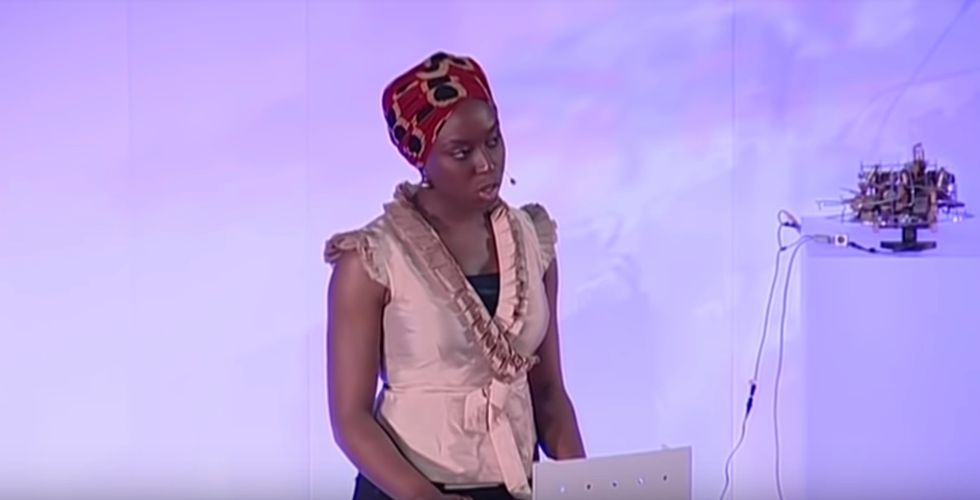For my study abroad program in Morocco, I had to watch this TED Talk and write a response journal. I could have written a response novel!
I am a bit of a TED Talk fanatic. I am sure most of us have either stumbled upon this video ourselves or had it assigned to us for homework. Either way, this video has a message that is so valuable, we should watch it again and again.
Before, during, and after my travels to Morocco, I was asked questions like, "How many terrorists did you see?" and "how many bombs and guns did you see?" Aside from terrorism, it was hard for people to believe that Moroccans have electricity, cars, phones and running water. Even before my travels, I was not as ignorant to think these things or ask such questions.
Not once was I worried about my own safety or in fear of terrorism.
Even after I had returned, I would start crying because no matter how many amazing things I said about Morocco, people still wouldn't believe me, as if I was lying to them. Because of the media and news platforms covering terrorism through an extremely narrow lens, our nation has become brainwashed to the idea that terrorism only exists in Islamic countries and that if anyone claims to be a Muslim, they must be innately evil.
We tend to ignore how many mass shootings happen in America that are not tied to Islam. If an American kills hundreds of innocent Americans, is that not terrorism? Why do we tend to brush off these events and focus on 9/11 and similar attacks?
In my first two weeks abroad, there was a man who killed 5 women in a bank execution style just because of a "broader desire to hurt people." Is that not terrorism? We continue to ignore the statistics showing that native-born Americans are the real ones invoking terror in our nation.
Chimamanda Ngozi Adichie spoke about "the danger of a single story" and how if we only listen to one story about a people or country, we close our hearts and minds to the idea that they could possibly be anything different. For Adichie, when she arrived to America from Nigeria, so many people she met were shocked that she spoke English and knew what a stove was. She points out that so many people don't even know that Africa is a continent, not a country.
She, as a woman who grew up in Nigeria her entire life, was told by a professor that her novel was not "authentically African" because she wrote about people who drove cars, were not starving, and had an education. Her professor said that they could not be African because they were "too much like him."
Why are we so surprised to discover that people from different religions or countries are just like us? Why can't we just simply know and believe that Muslims are people just like us?
Why do we only believe the single story so deeply that we think that reality is a lie?
She tells us how to create a single story: "Show a people as one thing, as only one thing, over and over again, and that is what they become."
She says, "power is the ability not just to tell the story of another person, but to make it the definitive story of that person." We tend to hear a story about one person, just one, who seems so different from us, and we apply that story to all the people of a certain population. In a single moment, we make one story the only story. When doing this, the only population we tend to forget is our own as white Americans.
Adichie had a student come up to her and say what a shame it is that Nigerian men were all physical abusers based off of the character in her novel. Her response was that she had just read American Psycho and it was a shame that all young Americans are serial murderers.
Why are we quick to apply a stereotype to another population so quickly and believe it so surely, but we become hesitant and offended when a stereotype is applied to our own people?
We don't allow ourselves to read, learn, or believe anything outside of the stories we see on the news. By allowing ourselves to be brainwashed by mass media rather than learning to form our own opinions only further enforces the stereotype. Adichie said, "The single story creates stereotypes, and the problem with stereotypes is not that they are untrue, but that they are incomplete."
We, ourselves, ruin the credibility of a people without ever meeting them. From the couch in our living room, we determine the nature of a people and alienate them without first thinking that they could possibly be people just like us.
Adichie says the consequence of a single story is, "It robs people of dignity. It makes our recognition of our equal humanity difficult. It emphasizes how we are different rather than how we are similar."
"Stories have been used to dispossess and malign, but stories can also be used to empower and humanize. Stories can break the dignity of a people, but stories can also repair that broken dignity."
We force stereotypes on people from different nations, backgrounds, ethnicities, and religions and we tell ourselves that this is reality while anything about white Americans is "fake news."
I am here to defend Morocco and its people. I am here to share stories about Moroccans and other Muslim people that are so far from the single story we have heard, but so much closer to the truth.






















